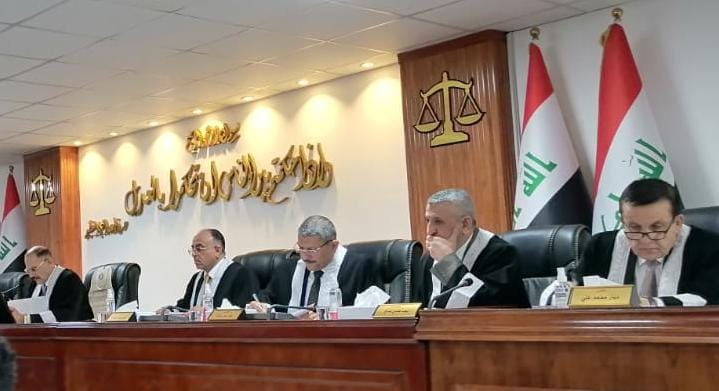For the first time in Iraq's history, Cassation court overturns a Federal Supreme Court ruling

Shafaq News/ Iraq's Court of Cassation overturned a ruling by the Federal Supreme Court on Thursday; an unprecedented move in the country's history.
The Federal Supreme Court, the highest judicial body in Iraq, had previously ruled in favorJudgeudge Ali Binyan Kahat, allowing him to retire with full benefits despite not meeting the service requirement for judges.
However, the Court of Cassation deemed the decision "null and void," arguing the Supreme Court overstepped its jurisdiction and misinterpreted the law.
Kahat's lawsuit against the head of the Supreme Judicial Council, Faeq Zeidan, sought retirement with benefits based on his combined years as a judge and lawyer.
The Court of Cassation, however, stressed judges require a minimum of 30 years solely in judicial service to qualify.
An abiding principle of the judicial process and the work of the courts is the court's adherence to the scope of the lawsuit and the claim. However, the FSC in its current composition has violated this abiding principle of the Iraqi Civil Procedures Law, No. 83 of 1969. The court has apparently seen some claims as an opportunity to extend the scope of the plaintiff's complaint and use them to manipulate and implement political agendas.
The first Constitutional Court in Iraq was established in Articles 81-87 of the 1925 Constitution. The court served as an independent institution in Iraq until 1979, when the Iraqi Judicial Council was merged with the Ministry of Justice during Saddam’s purge and the court lost its position and value. After 2003, the Coalition Provisional Authority (CPA) formed a senior committee to review the courts and judges, removed judges who were close to the former Ba'ath regime and thus created opportunities for new appointments. The Supreme Judicial Council regained its independence and was separated from the Ministry of Justice. CPA Order No. 35 in 2003 established the Supreme Judicial Council, headed by Chief Justice Madhat Mahmoud.
After the establishment of the Iraqi Governing Council, the enactment of the Transitional Administrative Law (TAL), and the confirmation of federalism, the provisions of Article 44 of the TAL established that a constitutional court would underpin the federal system. The Iraqi government—led by Ayad Allawi—issued Law No. 30 of 2005, which established the Federal Supreme Court also headed by Chief Justice Madhat Mahmoud explicitly for the pre-constitutional period in Iraq.
When the court was established, discussions on drafting a permanent constitution had begun. Ten months after the court was formed, Iraq's permanent Constitution was put to a referendum and approved in October 2005. At this point, the top court was intended to expire and required the passage of a law to form a permanent version of the FSC. Moreover, the court's only legal basis—Article 44 of the TAL—was annulled by Article 143 of the Constitution. Unlike the Iraqi High Criminal Court, which Article 134 of the newly-passed Constitution explicitly carried over from before, Article 92 explicitly required that the FSC be re-established by passing a new law through a two-thirds majority of parliamentary votes, a process that never occurred.





